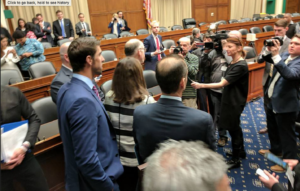By Madeline Roberts
If you are reading this you might fall under one of these two categories:
- You are a prospective WMI student or
- You are already a student of WMI, three or four weeks in desperately trying to figure out what you got yourself into.
No matter which one of these you might place yourself into, welcome! D.C. is an amazing place, full of unlimited possibility and opportunity. To help you best take advantage of your time here, I have compiled some of the best advice that I have received from WMI faculty and alumni thus far, in hopes of helping you succeed during your time in Washington, D.C.
“Become Furniture”
– Amos Gelb
This seems silly, right? What does becoming furniture even mean? Well, when you become furniture, whether it is at an  internship, at a job, or even in a friendship, you are becoming that person that someone can trust to hold them up. People don’t think about the chair before they sit in it, they just sit in it. You want to be the intern or employee that your boss always goes to because they trust you to do the work just how they would want it done. Ever since Amos told us this on our first day of class I have strived to become someone that my office can depend on. While every path to becoming furniture is different, some of the things I have been doing are:
internship, at a job, or even in a friendship, you are becoming that person that someone can trust to hold them up. People don’t think about the chair before they sit in it, they just sit in it. You want to be the intern or employee that your boss always goes to because they trust you to do the work just how they would want it done. Ever since Amos told us this on our first day of class I have strived to become someone that my office can depend on. While every path to becoming furniture is different, some of the things I have been doing are:
- Trying to go above and beyond on any assigned projects or tasks
- Showing up early and leaving late
- Anticipating the needs of the people in my office
- Taking on extra responsibilities without being asked
“Travel Above Ground”
– Katey Haas
Now don’t get me wrong, the Metro is fast, convenient, and reliable, but man was Katey right! There are so many things constantly going on in D.C. and the best way to get to know your new town is to see everything. I have been able to spot so many more things that I want to go to and check out, from food, to parks and events, and even landmarks, by just wandering around or riding the bus to and from work. If you are worried about looking too sweaty, don’t be! Everyone is. Get outside and enjoy the “fresh” air.
“Network, Network, Network”
– Literally EVERYONE
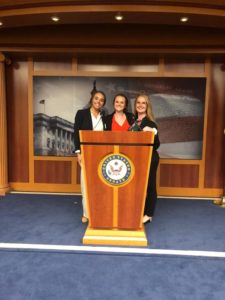 It turns out people here really do want to help you, so take advantage of it while you can! Go to networking events, reach out to someone you have just met, or ask to grab coffee with someone who has your dream job. The worst they can say is no, and that’s not even that bad. Believe me, I understand how intimidating it can be, and I am working on this myself, but you might as well try! Go to every event you never thought you would go to. Talk to everyone. And most importantly, say thank you!
It turns out people here really do want to help you, so take advantage of it while you can! Go to networking events, reach out to someone you have just met, or ask to grab coffee with someone who has your dream job. The worst they can say is no, and that’s not even that bad. Believe me, I understand how intimidating it can be, and I am working on this myself, but you might as well try! Go to every event you never thought you would go to. Talk to everyone. And most importantly, say thank you!
Finally, for a little bit of personal advice, utilize everyone at WMI. I am only three weeks into the program and I have been able to do so many cool things just because I asked if I could. Remember, it never hurts to ask.

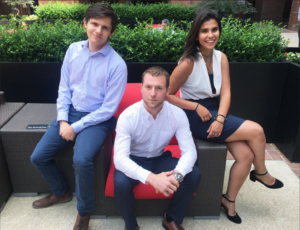 Everyone going into the public relations, advertising, and/or marketing fields understands the concept of an agency, but not everyone gets to experience it. I have been lucky enough to get a taste this summer of all that this particular realm of the industry has to offer and cannot overstate the positive effect it has had on my personal growth. Much of this is owed to the organization and people I interned for, who believe that all interns can bring more to the table than just getting coffee and doing work around the office. Working here has created a summer of growth and learning that will guide me for the rest of my life.
Everyone going into the public relations, advertising, and/or marketing fields understands the concept of an agency, but not everyone gets to experience it. I have been lucky enough to get a taste this summer of all that this particular realm of the industry has to offer and cannot overstate the positive effect it has had on my personal growth. Much of this is owed to the organization and people I interned for, who believe that all interns can bring more to the table than just getting coffee and doing work around the office. Working here has created a summer of growth and learning that will guide me for the rest of my life.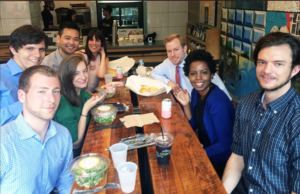
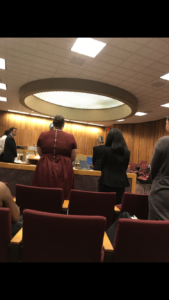 In the audience sits a family, and while it’s been years since they lost their loved one, they still wait with solemn faces. They lean forward in moments of a potential breakthrough and dismiss themselves when the evidence becomes too daunting. When the counsel continuously objects, further delaying long-awaited closure, those who knew the victim roll their eyes, scowl, or even go so far as to throw their hands in the air out of impatience. Some grab the hand of the person sitting next to them, maybe to channel their frustration less obviously or simply out of the need for comfort.
In the audience sits a family, and while it’s been years since they lost their loved one, they still wait with solemn faces. They lean forward in moments of a potential breakthrough and dismiss themselves when the evidence becomes too daunting. When the counsel continuously objects, further delaying long-awaited closure, those who knew the victim roll their eyes, scowl, or even go so far as to throw their hands in the air out of impatience. Some grab the hand of the person sitting next to them, maybe to channel their frustration less obviously or simply out of the need for comfort. 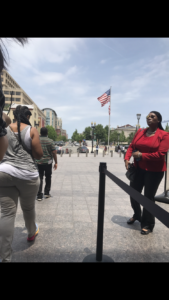
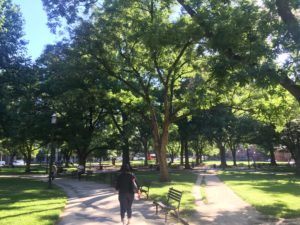
 counting cancel on me because we (mutually!) could not locate each other. Now that I’m about four weeks in, I have managed to figure out that yes, the streets are numerical, but bottom line is there is definitely room for improvement.
counting cancel on me because we (mutually!) could not locate each other. Now that I’m about four weeks in, I have managed to figure out that yes, the streets are numerical, but bottom line is there is definitely room for improvement.  an Uber to Cannon Office House. Other than that, I’ve relied on others to know where we are going and so far, it has worked – shout out to Catherine, even if we get to work 30+ minutes early!
an Uber to Cannon Office House. Other than that, I’ve relied on others to know where we are going and so far, it has worked – shout out to Catherine, even if we get to work 30+ minutes early! But despite all my mishaps, the most enjoyable part has been learning to navigate DC culture – figuring out how DC operates, learning to guide myself through meeting entirely new people, and being thrown into a new lifestyle. This crazy city is quite the culture shock, especially when you are being led (or more like thrown into the deep end) by Jon, Katey, and Amos. By week four, I have actually managed to understand the complicated, intertwined social scene and interactions, the balance necessary to balance work and class, and most importantly adulting. Overall, there is a learning curve, but if someone is teaching a navigation class, please, please sign me up.
But despite all my mishaps, the most enjoyable part has been learning to navigate DC culture – figuring out how DC operates, learning to guide myself through meeting entirely new people, and being thrown into a new lifestyle. This crazy city is quite the culture shock, especially when you are being led (or more like thrown into the deep end) by Jon, Katey, and Amos. By week four, I have actually managed to understand the complicated, intertwined social scene and interactions, the balance necessary to balance work and class, and most importantly adulting. Overall, there is a learning curve, but if someone is teaching a navigation class, please, please sign me up.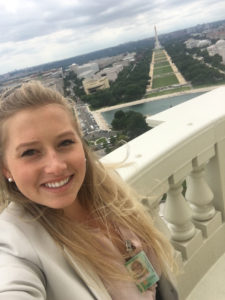
 I saw George Washington painted holier than Adam in the Sistine Chapel. There were statues that were so well-crafted you couldn’t discern them from the real thing. There were a lot quirky things that caught my attention; for example, a square man from Hawaii is featured on the House side. Turns out he was a leper and had to wear essentially a box his entire life because of the illness, so he was actually square.
I saw George Washington painted holier than Adam in the Sistine Chapel. There were statues that were so well-crafted you couldn’t discern them from the real thing. There were a lot quirky things that caught my attention; for example, a square man from Hawaii is featured on the House side. Turns out he was a leper and had to wear essentially a box his entire life because of the illness, so he was actually square.
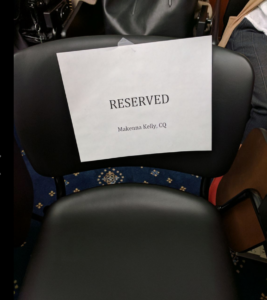
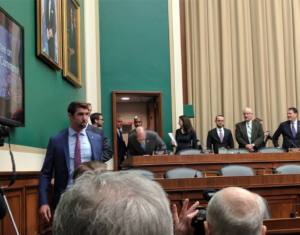 Michael Phelps gave his personal testimony. It was pretty standard to say the least, but the press went bonkers. Camera people were all over the place; ESPN, C-SPAN, CNN. You name it, they were crouched on the floor looking for the perfect angle of the most-adorned Olympian of all time.
Michael Phelps gave his personal testimony. It was pretty standard to say the least, but the press went bonkers. Camera people were all over the place; ESPN, C-SPAN, CNN. You name it, they were crouched on the floor looking for the perfect angle of the most-adorned Olympian of all time.